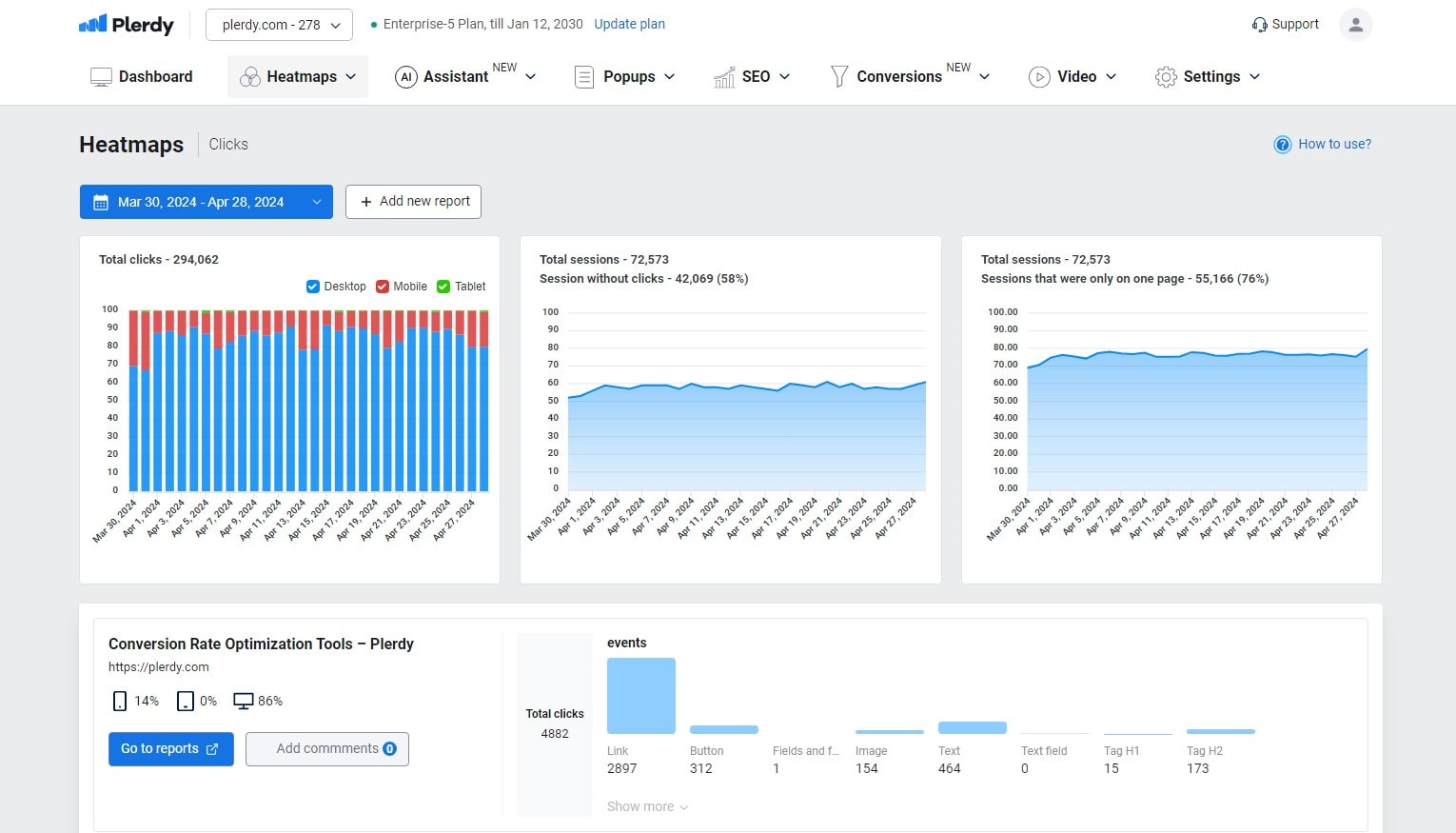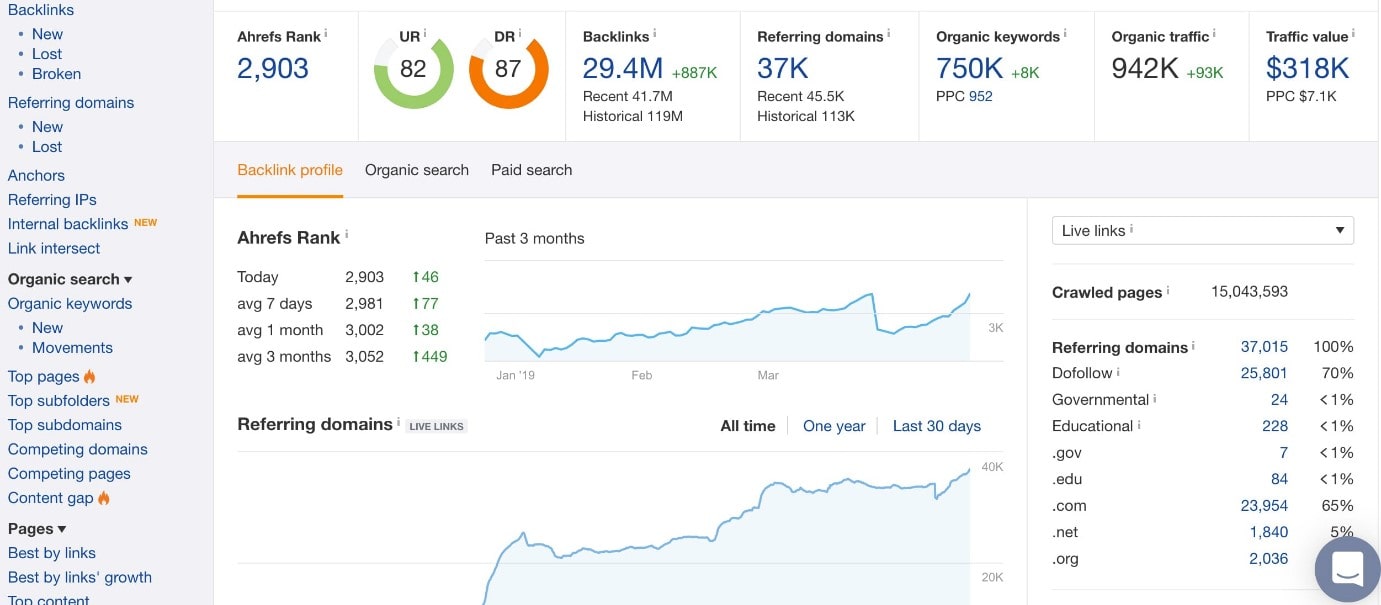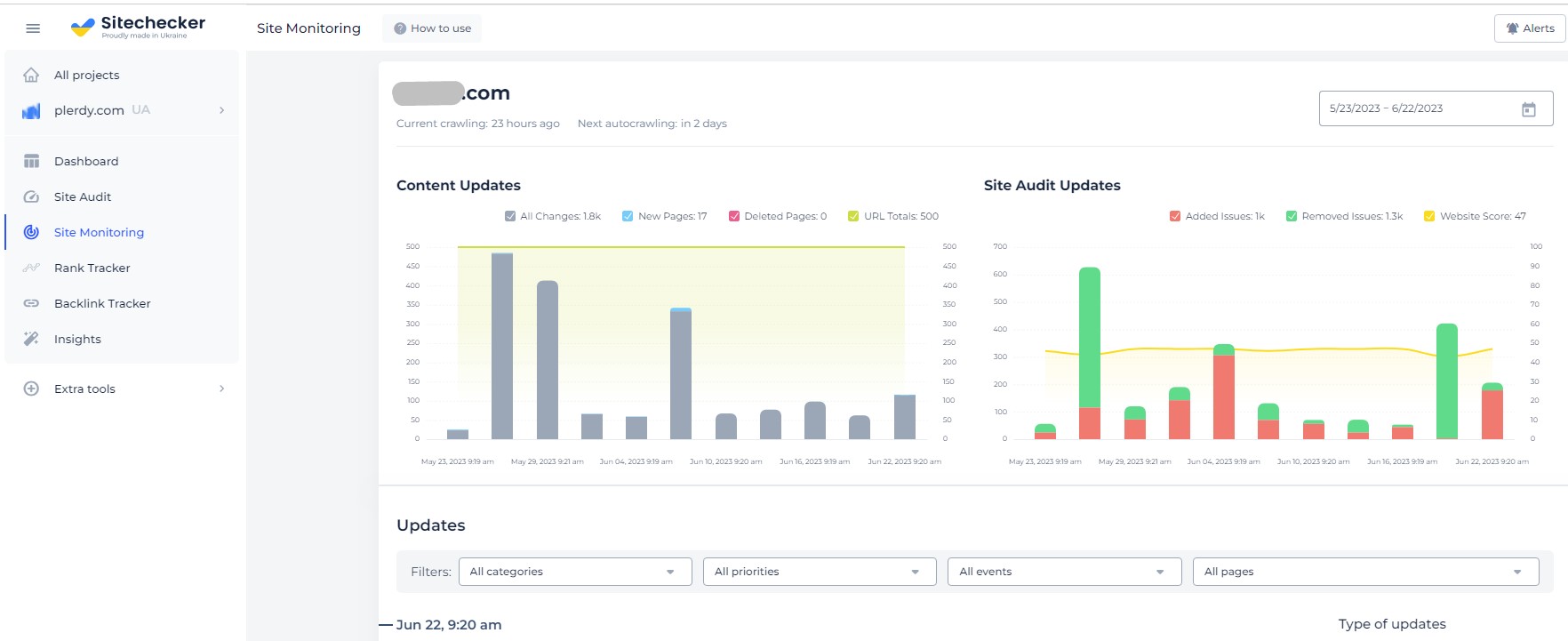Imagine SEO as a puzzle with keywords as pieces that must fit without guidance. It sounds like a comedian’s bad joke, but it’s a daily reality for digital marketers. Automated SEO reports come to the rescue, turning chaos into order. They streamline the process, making understanding how your website performs in search engines easier. With tools like Plerdy, generating these reports becomes not just simple but essential for strategic planning. This introduction to automated SEO reports will show why they’re helpful and crucial for anyone looking to dominate digital marketing.
Understanding Automated SEO Reports
SEO is constantly changing, so staying ahead is like catching a cloud—difficult but achievable. Enter automated SEO reports: your net for catching those elusive clouds. Let’s dive into what these reports are and how they transform data into actionable insights.
What Are Automated SEO Reports?
Automated SEO reports are comprehensive summaries generated by software detailing your website’s performance in search engine rankings. Unlike manual compilations, which can be tedious and prone to human error, these reports are produced with a click, offering a birds-eye view of your SEO health. They track various metrics, from keyword rankings to traffic flow, clearly showing where you stand in the digital landscape.
The Role of Automation in SEO Reporting
Efficiency, accuracy, and timeliness are all part of SEO reporting automation. By leveraging tools like Google Analytics or SEMrush, digital marketers can automatically gather data, allowing them to focus on strategy rather than data collection. The real magic lies in the ability to customize these reports to highlight the KPIs most relevant to your goals, ensuring every piece of data serves a purpose.
Understanding automated SEO reports is akin to mastering the art of navigation in the vast sea of digital marketing. These reports save time and equip you with the knowledge to make informed decisions, steering your SEO strategy toward success. As we harness the power of automation, we find clarity in complexity, turning data into our most valuable ally. For further reading on the impact of automated reporting, authoritative sources like Search Engine Journal and Moz offer deep dives into advanced tactics and the latest tools shaping the future of SEO.
Key Benefits of Automated SEO Reporting

Automated SEO reporting isn’t just a fancy add-on in the digital marketer’s toolkit—it’s the Swiss Army knife that sharpens, measures, and executes SEO strategies with precision. Let’s explore the undeniable benefits that make automated reports a non-negotiable asset.
Time Efficiency and Resource Management
Time is money; in the SEO world, it’s also accuracy and opportunity. Automated reporting saves hours or days that would otherwise be spent on manual data compilation. This efficiency allows teams to allocate more time to strategy and implementation, leading to faster responses to market changes. Google Analytics gives you a complete SEO performance report in a few clicks, freeing up resources for other important duties.
Accuracy and Reliability in Data Reporting
Data accuracy is crucial in SEO. Automated reports minimize human errors, providing a reliable foundation for decision-making. With this accuracy, your SEO approach is founded on facts, not conjecture, improving your marketing efforts.
Enhancing Decision-Making with Data Insights
Automatic SEO reporting is most powerful when it turns raw data into actionable insights. These reports highlight trends, pinpoint weaknesses, and identify opportunities, guiding strategic decisions that can significantly improve SEO performance. By understanding the story behind the data, marketers can tailor their strategies to meet their audience’s needs more effectively.
Scalability and Growth Support: As your digital presence grows, so does the complexity of managing your SEO. Automated reports scale with your business, offering insights to help manage this complexity and support growth. Whether tracking rankings across different geographies or monitoring the SEO health of numerous pages, automation ensures that your SEO strategy evolves with your business.
Automated SEO reporting is about more than just simplifying the mundane tasks of data collection and analysis. It’s about unlocking the full potential of your SEO strategy, ensuring every decision is informed, every action is measured, and every opportunity is seized. As we move forward in the ever-changing digital marketing landscape, embracing automation in SEO reporting is not just an option; it’s a strategic imperative. For those looking to delve deeper into the intricacies of SEO and automated reporting, resources like Search Engine Land and Ahrefs offer valuable insights and tips.
Selecting the Right KPIs for Impactful Automated SEO Reports
In the vast ocean of SEO, KPIs are your compass, guiding you through turbulent waters to reach your destination successfully. Selecting the right KPIs for your automated SEO reports isn’t just about tracking; it’s about aligning every metric with your strategic goals. Let’s navigate through the process of choosing KPIs that make an impact.
Aligning KPIs with Business Objectives
Every business has unique goals, from boosting online sales to increasing brand awareness. The first step in selecting KPIs is understanding these objectives clearly. For an e-commerce site, conversion rate and average order value might be key. For a content-driven site, page views and time on site reflect success. Aligning KPIs with your objectives ensures that your SEO efforts contribute directly to your business’s growth.
Examples of Effective KPIs for Various Business Types
Different KPIs will be relevant depending on your business model. For e-commerce, focus on organic traffic conversion rate and keyword rankings for product-specific terms. Service providers should track lead generation metrics sourced from organic search, like form submissions and phone calls. Content sites benefit from engagement metrics, such as bounce rate and social shares, which indicate content relevance and quality.
Selecting the right KPIs requires deeply understanding your business goals and how they translate into measurable SEO outcomes. Focusing on KPIs that reflect your strategic priorities ensures that your automated SEO reports provide actionable insights, driving informed decision-making and strategic adjustments. The most impactful KPIs directly correlate with your bottom line, enabling you to measure success in terms that matter most to your business. For further guidance on selecting effective KPIs, consider exploring resources provided by Moz or SEMrush, which offer comprehensive insights into tailoring your SEO strategy for maximum impact.
Implementing Automated SEO Reporting Tools

In the digital age, automated SEO reporting tools are both a convenience and a necessity. Embracing these tools means stepping into a realm where data-driven decisions lead. Let’s explore the seamless integration of these tools into your marketing strategy, ensuring your SEO efforts are monitored and amplified.
Criteria for Selecting SEO Reporting Tools
Choosing the right tool is pivotal. Look for one that offers comprehensive data collection across all relevant SEO metrics, such as keyword rankings, backlink profiles, and website traffic analysis. Compatibility with other tools in your marketing stack, like Google Analytics or CRM software, is crucial for a holistic view of your digital presence. Additionally, consider the tool’s ability to generate customizable reports catering to your organization’s stakeholders’ needs.
Customization and Integration Features
The power of an automated SEO reporting tool lies in its flexibility and integration capabilities. A top-tier tool should allow you to tailor reports to specific goals and audiences, ensuring that each report is relevant and actionable. Integration with analytics platforms and social media metrics is essential for a 360-degree view of your SEO performance. This interconnectedness streamlines workflow and enriches your SEO data, providing deeper insights for strategic planning.
Implementing automated SEO reporting tools in your digital marketing arsenal can significantly enhance your SEO strategy’s effectiveness. By choosing a solution that suits your demands and using its customization and integration features, you position your business for SEO and online success. Do not merely collect data; turn it into strategic insights that drive decisions. For those ready to dive deeper into the world of SEO tools, resources like Search Engine Land and TechCrunch offer in-depth reviews and comparisons to help you make an informed choice. Embrace the future of SEO with the right tools at your fingertips, and watch as your digital marketing efforts reach new heights.
Success Tales: The Power of Automated SEO Reports in Action

Behind every successful SEO campaign, there’s a tale of data, decisions, and strategic shifts. The protagonists? Automated SEO reports. Let’s uncover how these unsung heroes have powered real-world success stories, transforming the digital landscapes for businesses across the globe.
Industry Success Stories
Automated SEO reports have been the linchpin in achieving remarkable growth from small startups to multinational corporations. Take, for example, a fledgling e-commerce site that leveraged automated reporting to identify untapped keywords, leading to a 50% increase in organic traffic within months. Another success story comes from a content-driven website that used SEO report insights to optimize its most popular pages, doubling its page views and significantly reducing bounce rates.
Lessons Learned from Implementing SEO Automation
These success tales share common lessons:
- The importance of timely data must be balanced; real-time SEO reports allow these businesses to react swiftly to trends and algorithm changes.
- Customization of reports to focus on KPIs relevant to specific business goals was crucial in translating data into actionable strategies.
- Integrating SEO reporting tools with other digital marketing tools created a synergy that amplified their overall marketing efforts, proving that in the digital realm, the whole is greater than the sum of its parts.
Businesses using automated SEO reports demonstrate a digital marketing truth: data-driven decisions lead to demonstrable success. These reports are not just collections of numbers and graphs; they are roadmaps to achieving business objectives, enhancing visibility, increasing traffic, or driving conversions. For marketers ready to embark on their success journey, delving into resources like Moz’s Case Studies or Search Engine Watch can provide inspiration and practical insights. Let us recall the importance of automatic SEO reports as we close these success stories, ready to chronicle our digital era triumphs.
Conclusion
As we draw the curtains on the saga of automated SEO reports, remember this isn’t the end. It’s the beginning of a journey towards mastering digital marketing. With every click, scroll, and interaction, there’s a story waiting to be told through data. Automated SEO reports are your gateway to understanding and shaping these narratives, ensuring your strategies align with real-world behaviors and trends. Intrigued? The Plerdy blog is a treasure trove of insights and strategies ready to guide you through the ever-evolving digital marketing landscape. Utilize our tools and let Plerdy guide you through SEO. Ready to revolutionize your SEO strategy with Plerdy? Explore our tools and embark on a journey to digital marketing excellence.
